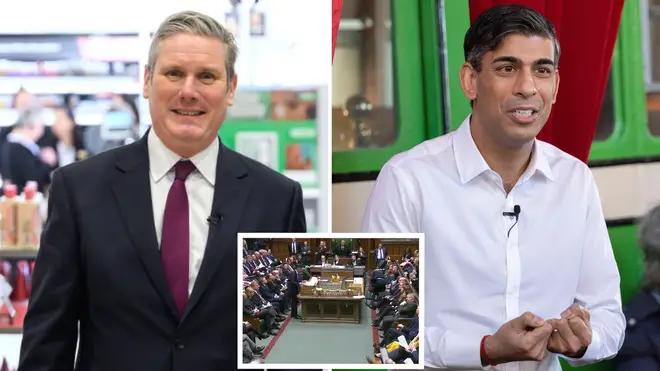
James O'Brien 10am - 1pm
16 January 2024, 10:12

Labour will need a historic swing to win the general election expected in 2024, as the party's path to power has been made more difficult by extensive boundary changes.
Sir Keir Starmer will have to achieve a swing of 12.7 points from the Conservatives to become prime minister, new research shows - larger than the 10.2 point swing Tony Blair managed in his 1997 landslide, and more than double the swing at any other election since 1945.

The new parliamentary constituencies were drawn up by the permanent and independent Boundary Commissions for England, Scotland, Wales and Northern Ireland, and fewer than 12% of the 650 Commons seats were left untouched.
Prime Minister Rishi Sunak said earlier this month "my working assumption is we'll have a general election in the second half of this year" with a date in October or November considered most likely.
The boundary changes give him a modest boost, analysis by professors Colin Rallings and Michael Thrasher suggests, after they compiled notional results for what would have happened at the last general election in 2019 had it been fought on the new constituencies.
"Broadly speaking this reflects a pattern where the east, south east and south west of England have gained seats reflecting the increase in electorates, and Wales has lost them, following the implementation of the new rules," the academics say.
"The overall impact is that the Conservatives will be defending a notional majority of 94 at the next general election compared with the 80 majority they actually achieved in 2019.
"The Conservatives have made a net gain of seven seats from the new boundaries; Labour has a net loss of two seats. The Liberal Democrats lose three seats and Plaid Cymru drops from four seats to just two."
The changes mean England is allocated 543 seats, an increase of 10. Wales will have 32 seats, a reduction of eight. Scotland will have 57, down two. Northern Ireland remains unchanged with 18.
Despite the cut in the number of seats in Scotland, the SNP remain on 48 seats, and there is no change in Northern Ireland, with the DUP on eight, Sinn Fein seven, SDLP on two and Alliance on one.
The four Boundary Commissions were obliged to ensure the new constituencies have an electorate within 5% of 73,392, which is the total number of voters on March 2 2020 divided by 650, the number of Commons seats.
This gives all constituencies between 69,724 and 77,062 electors with just five "island seats" exempt - Orkney and Shetland, Na h-Eileanan an Iar (Western Islands) in Scotland, Ynys Mon (Anglesey) in North Wales and the two seats allocated to the Isle of Wight. The Conservatives won 365 seats in the snap 2019 December election, with Jeremy Corbyn's Labour on 203, giving Boris Johnson a majority of 80, and 162 over Labour.

While the number of Conservative MPs is now down to 349, partly because of by-elections, with another two next month, that makes no difference to the calculations for the general election, which are based solely on the notional results. Following the 2019 election, a direct swing of seven percentage points from the Conservatives was needed for Labour to become the largest party in a hung parliament, and the boundary changes mean this rises to 8.3 percentage points.
For an overall majority, Sir Keir's 12.7 point requirement is up from 12 on the old boundaries, and any uniform swing from Conservatives to Labour greater than 4.2 and less than 12.7 is likely to produce a hung parliament.
However, focusing only on the direct swing between Conservatives and Labour makes the assumption there will be no change in the share votes cast for the other parties, which is highly unlikely to be true.
For instance, a 10 point swing from the SNP to Labour would give Sir Keir 15 gains under the new boundaries, easing his path to Downing Street, according to professors Rallings and Thrasher.
They compiled their notional results on behalf of BBC News, ITV News, Sky News and the PA news agency.